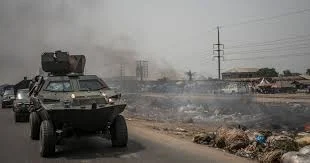Amnesty International has issued a chilling report detailing a deadly separatist attack along the Okigwe-Owerri highway in Southeastern Nigeria. According to the organization, over 30 individuals lost their lives in the attack, which occurred in the early hours of the day. In addition, more than 20 vehicles were set on fire, leading to widespread chaos and panic in the region.
This attack is the latest in a series of violent incidents tied to the growing separatist movements in Nigeria’s Southeastern region, with tensions reaching new heights in recent months. The separatists, primarily from the Indigenous People of Biafra (IPOB), have been demanding the secession of the southeastern states and the creation of an independent Biafran state.
Amnesty International reports that armed separatist militants ambushed motorists traveling along the highway, blocking the road and launching a series of attacks. Witnesses reported hearing gunshots and seeing the flames from the burning vehicles. Many victims were reportedly civilians, including bus passengers and commuters who had little to no connection to the ongoing political unrest.
Also Read: Police Now Worship Fraudsters and Politicians’ Side Chicks - Deji Adeyanju Blows Hot
The Okigwe-Owerri highway, a major route connecting towns in Imo State, is frequently used by both locals and travelers. The attack has caused widespread fear and uncertainty, with residents of the area now feeling increasingly vulnerable to further violence.
The attack marks a troubling escalation in the ongoing violence tied to separatist movements in Southeastern Nigeria. Over the past year, clashes between government forces and separatist militants have intensified, resulting in numerous casualties and significant disruptions to local economies. Security forces have been accused of heavy-handed tactics, while separatist groups continue to carry out attacks in an attempt to push for their demands.
This attack has intensified calls for the Nigerian government to address the root causes of the violence in the region, including the rising grievances of local communities and the increasing militarization of the area. However, a political solution remains elusive, as the government has remained steadfast in its refusal to grant independence to the Southeastern region.
Amnesty International has condemned the attack, calling for an immediate investigation and the protection of civilians in the region. The organization has expressed concern over the escalating violence and the toll it is taking on innocent lives. There have been increasing international calls for accountability on both sides, urging both the Nigerian government and separatist groups to engage in dialogue to find a peaceful resolution.
The Nigerian government has yet to issue an official statement regarding the attack, but the country’s security forces have been ramping up their presence in the region in response to the growing unrest. The government’s approach, however, has faced criticism for exacerbating the situation rather than addressing the underlying political and economic issues.
Also Read: Until Atiku Fixes the Power Problem He Helped Create, Nigerians Will Keep Rejecting Him
The violence in Southeastern Nigeria is a reflection of the deep divisions within the country. While the government remains opposed to the idea of Biafran independence, the demand for a separate state continues to grow, fueled by years of perceived marginalization, poor infrastructure, and underdevelopment in the Southeast. The continued unrest in the region has also sparked debates over the role of federalism and self-determination in a multi-ethnic country like Nigeria.
As the conflict persists, it is unclear when or how a resolution will be reached. The Nigerian government has vowed to continue its crackdown on separatist groups, but for many in the Southeast, the demand for independence remains a key issue that will not be easily resolved.










No comments:
Post a Comment
Join the conversation by leaving a comment below. Keep it respectful, relevant, and on-topic - we love hearing from our readers!